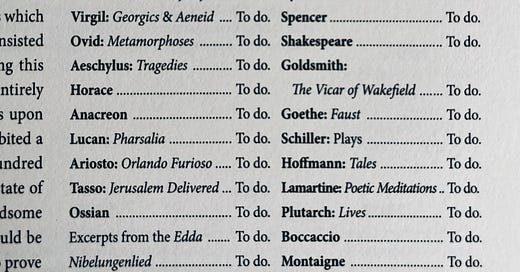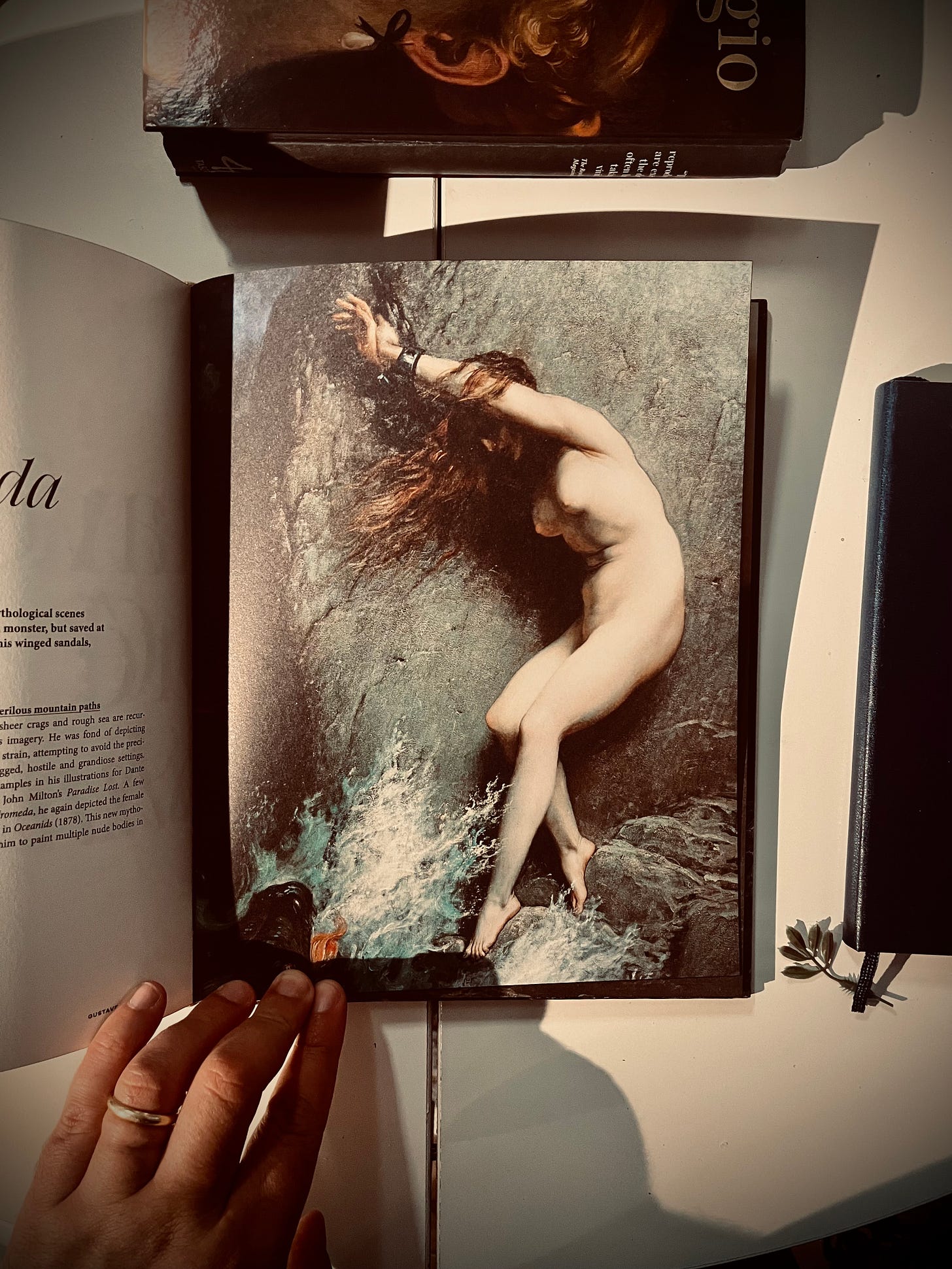My Reading List for the Next 10 Years
A book read by a thousand different people is a thousand different books.
People do not know what it costs in time and effort to learn to read.
I needed eighty years for this and I’m not even able to say if I have succeeded.
~ Johann Wolfgang Von Goethe to his student Eckermann
In 1865, Gustave Doré - one of the most magnificent illustrators who ever lived - told his mother of a list of books that he wanted to illustrate in the next few decades of his life.
Doré was a magician who possessed the secret recipe for an elixir that granted anyone who drank it the chance to approach the pantheon of great minds. The recipe is simple: if you want to become great, you must also be ready to wrestle with the great. Doré’s list included literary heavyweights that spanned two millennia. From Ovid’s Metamorphoses to Dante’s Divine Comedy; from Plutarch’s Lives to Montaigne’s Essays. His plan for the next few decades of his life was ambitious, to say the least.
Anyone who has seen Doré’s pieces for Dante’s Inferno or the Old Testament knows that they are not merely great additions to these stories, but they tell their own tales. His engravings bewitch us with their sublime atmosphere. Our metaphorical magician understood that illustrations are not merely supplements to a literary text; great illustrations are texts themselves, written with a brush.
I could write an entire book about Doré’s unique style of illustration but let’s go back to the list that he had dictated to his mother. What fascinated me about it is not only his exceptional taste in literature (the works he selected will be remembered not just in centuries but in millennia); not only the diversity of genres that the list possesses (from poetry, history, essays, plays, epics, tragedies, comedies); what fascinated me the most in this list is that he envisaged and planned his life for the next three decades.
While today's self-help gurus advise us to envision where we want to be in five years, Doré crafted a plan for what he wanted to create over the next thirty years. The books he selected captured his attention and imagination for the rest of his life. Sadly, he composed the list when he was thirty-three years old and passed away at the age of 52.
After hearing about Doré’s ambitious list one inadvertently wants to compose a similar list for oneself. The trouble however is that I possess no great talents. I cannot draw; I cannot compose music; and I am no scientist who can unravel the secrets of the universe. Yes, I am not an illustrator or a composer, but I am a passionate reader.
I must confess that despite being a passionate reader, I cannot say I have always been an attentive one. I do not know well even the books that I call my favourite. I still have to re-read deeply Marguerite Yourcenar’s Memoirs of Hadrian; re-experience Dante’s The Divine Comedy; and join the journey once again with Odysseus and Aeneas to see what I can learn from their path.
Goethe, whose tragedy called Faust was on Doré’s list, told to his student:
People do not know what it costs in time and effort to learn to read. I needed eighty years for this and I’m not even able to say if I have succeeded.
Learning how to read does not begin and end at school. It is a lifelong journey. When we read great works of literature we do not merely experience plots and storylines, with each great work of literature, we also learn how to read over again.
How great is a particular book often depends on the capacity of its reader. Goethe knew that the quality of a book depends on the quality of a reader’s attention.
In the next few decades of my life, I want to increase my capacity of reading and deepen the quality of my attention. I will borrow a small drop of that secret elixir from Doré’s recipe and begin to wrestle with the great to learn how to read. What do I mean by this?
From 2025, I want to dedicate each year of my life (or, however much time a book will demand) to a particular book. Some call this type of reading a slow-read but I do not think that the speed defines what I aim to achieve. My goal is to absorb each masterpiece of literature by immersing my mind deeply into each sentence. I am particularly inspired by the French philosopher Pierre Hadot who masterfully converted genius works of literature and philosophy to practical spiritual exercises.
For you, my dear reader, this means that I am going to do read alongs, deep dives, slow-reads of the greatest works ever written to see how we can sculpt ourselves for the better. We are going to delve into each Canto of The Divine Comedy; decipher practical wisdom of Les Misérables; get deep into the philosophy of Marguerite Yourcenar’s Memoirs of Hadrian; learn lessons of resilience from Virgil’s Aeneid; and learn the art of war with Thucydides.
We will explore contemporary books as well: Tom Holland’s Dominion; Ian McGhilchrist’s Master & His Emissary; and Alex Ross’s The Rest is Noise.
My List
Next week I will share with you my list of 10-20 books that I am planning to read over the next few decades. In the mean time let me know which books you think are worth diving deep into. In other words if you could read or re-read just one book next year, which one would it be?
Join the journey
“A book read by a thousand different people is a thousand different books.”
~ Andrei Tarkovsky
Tarkovsky’s quote perfectly illustrates the magic of read-alongs. Each reader of Tolstoy’s War & Peace read-along made by
shares how they interpret that complex masterpiece of literature.For you to enjoy this exciting new journey and get the most of my read-alongs I would strongly recommend downloading the free Substack app.
Without the app you cannot see messages I send in the group chats or notes that I post daily here. It’s free, easy to login and will improve your experience.
I haven’t been excited about a project this much for a long time!









I just finished my third translation/reading of Bulgakov's Master & Margarita, which equals the number of times I started it and put it down. The novels smolders and then ignites into a wild ride toward a mind-blowing conclusion.
This sounds like a fabulous project! I'll make sure to add your readalongs to the directory, and I'll enjoy seeing it unfold.
https://footnotesandtangents.substack.com/p/substack-book-group-directory